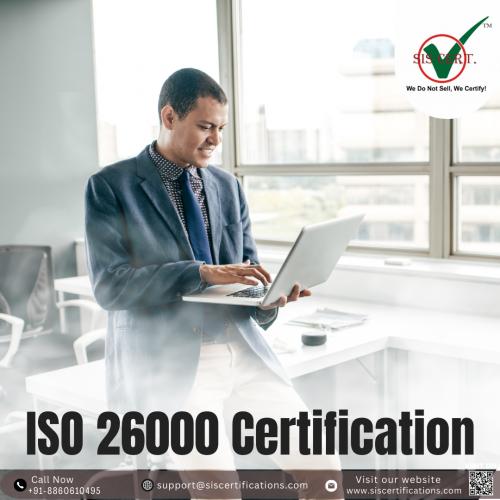ISO 26000 Certification Services: Guiding Your Organization Toward Social Responsibility

In today's interconnected and conscious world, businesses are increasingly judged not only by their financial performance but also by their social and environmental impact. As stakeholders demand greater transparency and responsibility, adopting a framework like ISO 26000 can be a game-changer. But what exactly is ISO 26000, and how can certification services help your organization align with its principles? Let's delve into the world of ISO 26000 certification services and discover how they can guide your organization toward enhanced social responsibility.
Understanding ISO 26000
ISO 26000 is an international standard that provides guidance on social responsibility. Unlike other ISO standards, it is not intended for certification but serves as a comprehensive framework to help organizations operate in a socially responsible way. The standard covers seven core subjects:
- Organizational governance
- Human rights
- Labor practices
- The environment
- Fair operating practices
- Consumer issues
- Community involvement and development
By integrating these principles into your operations, ISO 26000 helps ensure that your business not only meets legal requirements but also contributes positively to society and the environment.
The Role of ISO 26000 Certification Services
While ISO 26000 itself is not a certifiable standard, many organizations seek external verification to demonstrate their commitment to social responsibility. This is where ISO 26000 certification services come into play. These services offer a structured approach to assessing and validating your organization's adherence to the guidelines outlined in ISO 26000.
Benefits of ISO 26000 Certification Services
Enhanced Credibility and Reputation:
Engaging in ISO 26000 certification services can significantly boost your organization's credibility. Independent verification from a reputable certification body reassures stakeholders that your commitment to social responsibility is genuine and robust.
Stakeholder Trust and Engagement:
By demonstrating adherence to internationally recognized social responsibility standards, you foster trust and engagement among customers, employees, investors, and the broader community. This trust can lead to increased loyalty, better employee morale, and more robust investor relations.
Risk Management and Compliance:
Certification services help identify potential risks and areas for improvement in your social responsibility practices. By addressing these proactively, you not only ensure compliance with legal and ethical standards but also mitigate risks that could harm your reputation and bottom line.
Competitive Advantage:
In a market where consumers and partners are increasingly discerning, demonstrating a commitment to social responsibility can differentiate your organization from competitors. This can open up new business opportunities and partnerships that prioritize ethical and sustainable practices.
Operational Efficiency and Cost Savings:
Implementing the guidelines of ISO 26000 can lead to more efficient use of resources, better waste management, and improved labor practices. These improvements often result in cost savings and more streamlined operations.
The Certification Process
Engaging in ISO 26000 certification services typically involves several key steps:
Gap Analysis:
An initial assessment is conducted to identify gaps between your current practices and the ISO 26000 guidelines. This helps in understanding the areas that require improvement.
Training and Awareness:
Employees and management are trained on the principles of ISO 26000 to ensure everyone is aligned with the standard's requirements and the organization's social responsibility goals.
Implementation:
Based on the gap analysis, a detailed action plan is developed and implemented. This may involve revising policies, improving processes, and enhancing stakeholder engagement practices.
Internal Audit:
An internal audit is conducted to assess the effectiveness of the implemented changes and ensure they align with ISO 26000 guidelines.
External Verification:
An independent certification body conducts an external verification to assess your organization’s adherence to ISO 26000. Upon successful verification, a
certification report is issued, providing an external validation of your social responsibility practices.
Choosing the Right Certification Service
Selecting the appropriate certification service provider is crucial to ensure a thorough and credible assessment. Here are some factors to consider:
Reputation and Experience:
Choose a certification body with a strong reputation and proven experience in social responsibility and sustainability assessments. Look for providers with a track record of working with organizations in your industry.
Expertise and Knowledge:
Ensure the certification service has a team of experts who are well-versed in ISO 26000 and other relevant standards. Their expertise is critical in providing accurate guidance and meaningful recommendations.
Tailored Services:
Opt for a certification service that offers tailored solutions to meet your organization’s unique needs. A one-size-fits-all approach may not effectively address your specific challenges and objectives.
Comprehensive Support:
A good certification service should provide ongoing support, including training, workshops, and continuous improvement guidance. This helps ensure that your organization remains aligned with ISO 26000 principles over the long term.
Transparency and Integrity:
The certification process should be transparent, with clear communication at every stage. Choose a provider that upholds the highest standards of integrity and impartiality.
Embracing Social Responsibility
Adopting ISO 26000 and engaging in certification services is more than just a compliance exercise; it’s a strategic move toward sustainable and ethical business practices. By aligning with ISO 26000, your organization demonstrates a commitment to making a positive impact on society and the environment, which can lead to numerous long-term benefits.
In conclusion, ISO 26000 certification services play a vital role in guiding organizations on their journey toward social responsibility. They provide the structure, expertise, and validation needed to ensure your social responsibility initiatives are effective, credible, and aligned with global standards. As the business landscape continues to evolve, prioritizing social responsibility through ISO 26000 can position your organization as a leader in ethical and sustainable practices, driving both social good and business success.
Comments